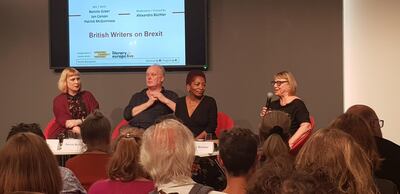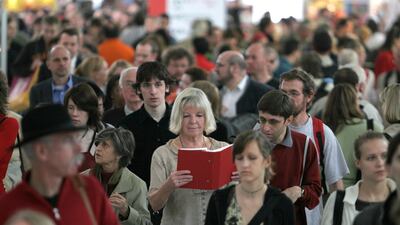The seeds of Brexit have been planted over decades. This was one of the key points raised in an intriguing panel discussion at the Frankfurt International Book Fair on Friday, October 18.
The session, entitled British Writers on Brexit, featured American-English playwright Bonnie Greer, Northern Irish author Jan Carson and British-Belgian novelist Patrick McGuinness, as they explored the societal factors that led to the British people's vote to leave the European Union.
While the panellists admitted they are anti-Brexit, they also offered various neutral insights on how it came to pass. What they all agree on is that Brexit is not so much a surprise, but the result of a society in deep flux.
Greer, who is presently chancellor of London's Kingston University, stated the UK has yet to undergo the kind of self-examination that German society did post World War II.
“If you are German of my generation there is a constant interrogation of the past, constant looking at the present and thinking about the future,” she said. “And that future is about being in solidarity and always defeating nationalism and this idea of being separate.”
It is this lack of reflection, Greer said, that has created a hotbed of resentment that has been festering in the UK over generations.
“I have told Brexiters that I will give [them] a hundred pounds to any charity if [they] tell me what in Europe upsets them enough to vote to leave. And they can’t answer because it’s not about Europe,” she continued. “What is happening in the UK is a cauldron and everything is poured in it. Germans have learned how to take such a situation and look it in the eye. I am not saying that you solved it, because you haven’t, but you can at least look at it. The United Kingdom cannot do this and this is why we are where we are.”

McGuinness, whose 2011 debut novel The Last Hundred Days was longlisted for the Booker Prize, said he eschews discussions about how the British identity has led to Brexit.
“There are parts of British identity we were all once quite proud of. These are things like the National Health Service being free and a more or less functioning union of different nations. But now, these debates about identity have become macho. They are now about symbols such as The Queen and the pound and immigration,” she said.
“Look, debates about identity are important and they need to be revisited over and over, but you can’t keep defining it by what you are against or things can go horribly wrong.”
A community worker as well as a novelist, Carson said the best way to tackle such deep-rooted resentments is by investing in the arts. To illustrate her point, she described how creative initiatives played a central role in healing the divisions in Irish society.
“I turned 18 years old one month after the Good Friday peace agreement was signed. One of the huge things that took our country forward and helped us engage with both sides of the debate is the arts,” she said. “This is because when you grow up in a society that is obsessed with binary-isms, you have a limited ability for empathy, to think objectively or even listen. And what the art did [in Northern Ireland and Ireland] is teach people those skills and think critically and with empathy.”
McGuinness agreed. He believes that a society’s health can always be measured by its relationship with the arts. “Just like the ancient world, all the dark forces in the modern world, such as politicians and the media, want to limit our curiosity. They want us to stop asking stuff, like what are our neighbours doing?” he added. “When you kill curiosity, you kill imagination and eventually the public discourse.”
The Frankfurt International Book Fair runs until Sunday, October 20. The fair is the largest annual gathering of international publishers, featuring more than 7,300 exhibitors from over 100 countries.


